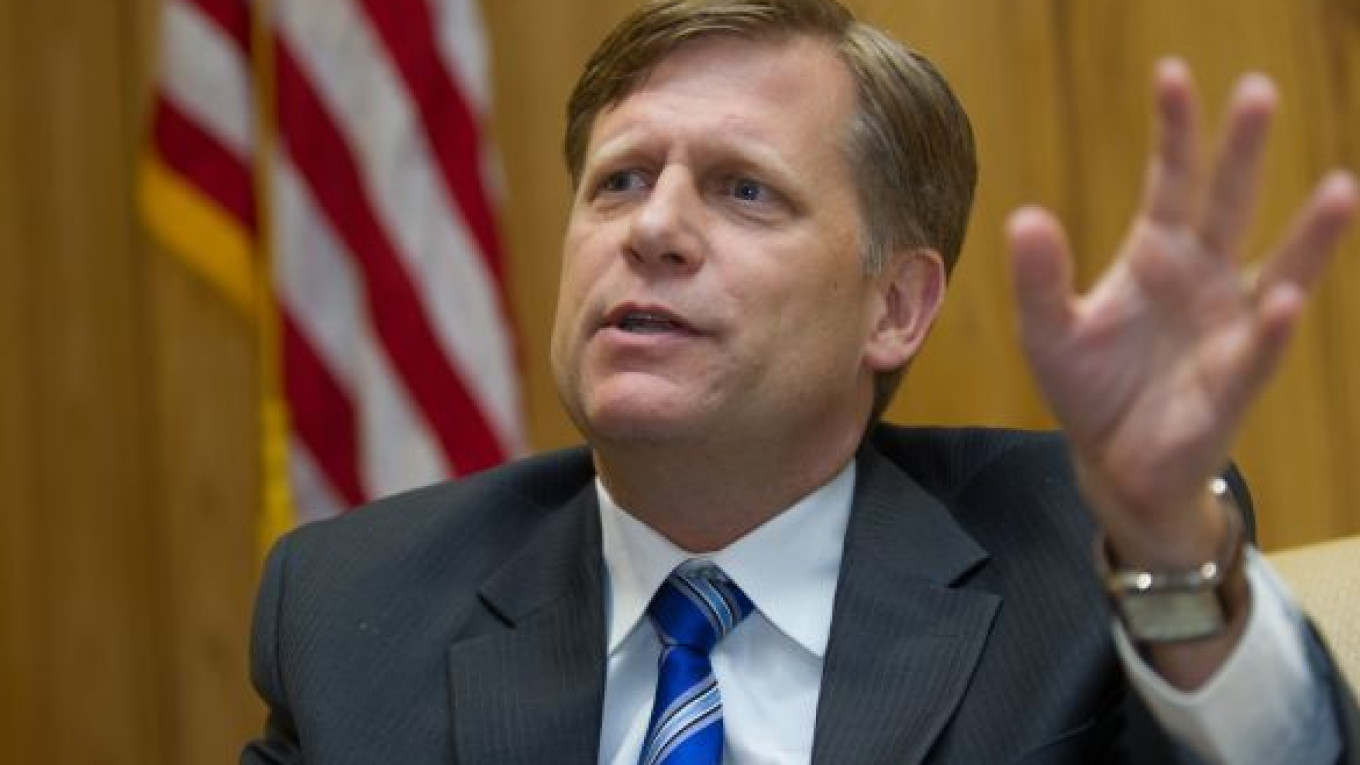The so-called Magnitsky bill is unnecessary because U.S. President Barack Obama's administration has already dealt with demands to punish Russian officials involved in human rights violations, Ambassador Michael McFaul said Thursday.
McFaul pointed out that the U.S. State Department now had "enhanced powers to review" immigration cases. "In our view, this issue has been resolved," he said.
The ambassador added that the State Department had a "watch list" of Russian citizens that was "really, really long," but that overall the refusal rate for Russians applying for U.S. visas was relatively low.
McFaul was speaking at a question-and-answer session with students at Moscow's New Economic School, just as the news broke that the House of Representatives' Foreign Affairs Committee had moved the controversial bill forward.
He did not comment directly on the bill's passing but said he thought that it had helped raise attention to the issue.
The ambassador's appearance before the students came just two weeks after a similar one at the Higher School of Economics, which led the Russian Foreign Ministry and the Kremlin to accuse him of undiplomatic behavior for suggesting that Moscow had "bribed" Kyrgyzstan over the Manas air base.
This time McFaul delivered the same lecture about the "reset" in U.S.-Russian relations, but he apologized again for having used the word "bribe" to describe both Washington and Moscow's attempts to secure the military base in the Central Asian country. "I should have said 'economic assistance package,'" he told the audience, which reacted with laughter.
"It is an empirical fact that I am not a professional diplomat, but that is no excuse to make mistakes that do not help us to promote our national interest," he said.
But the ambassador was adamant that he represents his country not just to the government but all of Russia and that he would continue to engage with society directly, via media and social networks like Twitter and Facebook, even though he admitted receiving at least one tweet per day with "[expletive] you" from Russian Twitter users.
"I came here with a mandate from [Secretary of State Hillary] Clinton to be a 21st-century diplomat. She told me to 'get out there because if we are not in that space, were only playing in one dimension,'" he said.
McFaul also renewed his criticism of RT, the state-funded English-language television channel formerly known as Russia Today. He recalled the channel's campaign in Washington a few years ago that included billboards with Obama and Iranian President Mahmoud Ahmadinejad and the catch phrase "Who Poses the Greater Nuclear Threat?"
"We took issue at that," he recalled. "This was a rather strange paradigm that is not in the spirit of our relationship," he said. But he added that he had since met with the channel's editor, Margarita Simonyan.
Much of the U.S.-Russian reset was about overcoming stereotypes, McFaul said.
"A common misconception among Americans is that Russians love dictatorship," he quipped. "That's a stereotype we must undermine."
A Message from The Moscow Times:
Dear readers,
We are facing unprecedented challenges. Russia's Prosecutor General's Office has designated The Moscow Times as an "undesirable" organization, criminalizing our work and putting our staff at risk of prosecution. This follows our earlier unjust labeling as a "foreign agent."
These actions are direct attempts to silence independent journalism in Russia. The authorities claim our work "discredits the decisions of the Russian leadership." We see things differently: we strive to provide accurate, unbiased reporting on Russia.
We, the journalists of The Moscow Times, refuse to be silenced. But to continue our work, we need your help.
Your support, no matter how small, makes a world of difference. If you can, please support us monthly starting from just $2. It's quick to set up, and every contribution makes a significant impact.
By supporting The Moscow Times, you're defending open, independent journalism in the face of repression. Thank you for standing with us.
Remind me later.


